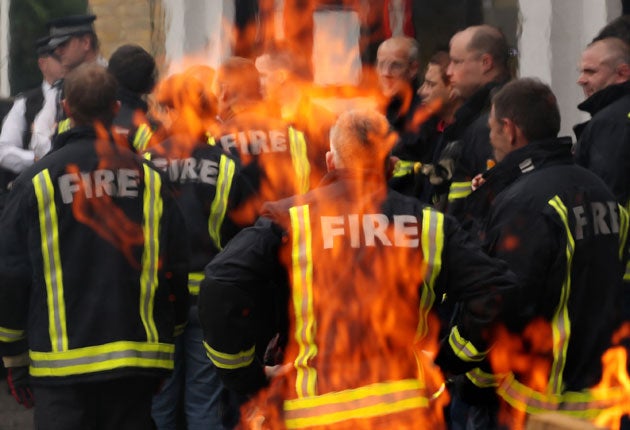Union leaders tonight warned that crucial talks aimed at heading off strikes over pensions could be hit after Business Secretary Vince Cable said that widespread industrial action could ratchet up pressure on the Government to strengthen strike laws.
The minister was heckled when he addressed a union conference despite going out of his way to stress that the right to strike was a "fundamental principle".
Several parts of his speech to the GMB annual conference in Brighton were interrupted by shouts, boos and catcalls from delegates, while some held up a banner which read: "Vince Cable not welcome - Stop Attacking Workers' Rights."
One of the final round of talks aimed at resolving a simmering row over cuts to public sector pensions is due to be held on Thursday between the Government and leaders of several unions.
Some union officials warned that Dr Cable's warning had soured the atmosphere and made it less likely that a deal can be reached this week.
Union leaders criticised the speech as "ill-judged", but business groups said there was a strong case for modernising the law on industrial relations.
Hundreds of thousands of teachers, civil servants and other workers are being balloted on industrial action, raising the prospect of co-ordinated strikes by three quarters of a million employees on June 30 over cuts to pensions, pay, jobs and services.
Dr Cable said: "Later this month, we may very well witness a day of industrial action across significant parts of the public sector.
"The usual suspects will call for general strikes and widespread disruption. This will excite the usual media comments about 'a summer' or 'an autumn' of discontent, and another group of the usual suspects will exploit the situation to call for the tightening of strike law.
"We are undoubtedly entering a difficult period. Cool heads will be required all round. Despite occasional blips, I know that strike levels remain historically low, especially in the private sector. On that basis, and assuming this pattern continues, the case for changing strike law is not compelling.
"However, should the position change, and should strikes impose serious damage to our economic and social fabric, the pressure on us to act would ratchet up. That is something which both you, and certainly I, would wish to avoid."
GMB president Mary Turner had to intervene during the speech and ask delegates to listen, saying: "You may not like what you are hearing, any more than I do, but please listen."
Asked about the reception he had received, Dr Cable said later that it had been "perfectly fair", adding: "A bit of heckling, but you expect that."
Prime Minister David Cameron's spokesman told reporters that there were no current proposals to change the law on the right to strike, but made clear that ministers were ready to review the position if there was a wave of "irresponsible" disputes.
GMB general secretary Paul Kenny said he thought Dr Cable's remarks about strike laws were "ill-judged", adding: "He showed a remarkable lack of understanding about the impact of public spending cuts on workers and communities and didn't seem to know of the pay freeze in local government."
Sarah Veale, the TUC's head of equalities and employment rights, said: "The UK already has some of the toughest strike legislation in the developed world so there is no justification for further curbs, as the minister himself acknowledges."
Unite leader Len McCluskey said: "Talking tough about cracking down on working people is a circus engineered by a Government that is clueless about the real problems facing this country, which is how do we breathe life back into our shops, businesses and high streets and how do we get the millions on the dole back to work."
Neil Carberry, the CBI's director for employment, said: "There is a strong case for modernising the law on industrial relations to reflect the way workplaces have changed, with just 14% of private sector staff now members of unions.
Dr Adam Marshall, director of policy at the British Chambers of Commerce, said: "Vince Cable is right to warn unions against mass strikes in the months ahead. In the current climate, large-scale industrial action would have a significant impact on business confidence and inward investment, which are both critical to the UK's economic recovery."
Subscribe to Independent Premium to bookmark this article
Want to bookmark your favourite articles and stories to read or reference later? Start your Independent Premium subscription today.


Join our commenting forum
Join thought-provoking conversations, follow other Independent readers and see their replies